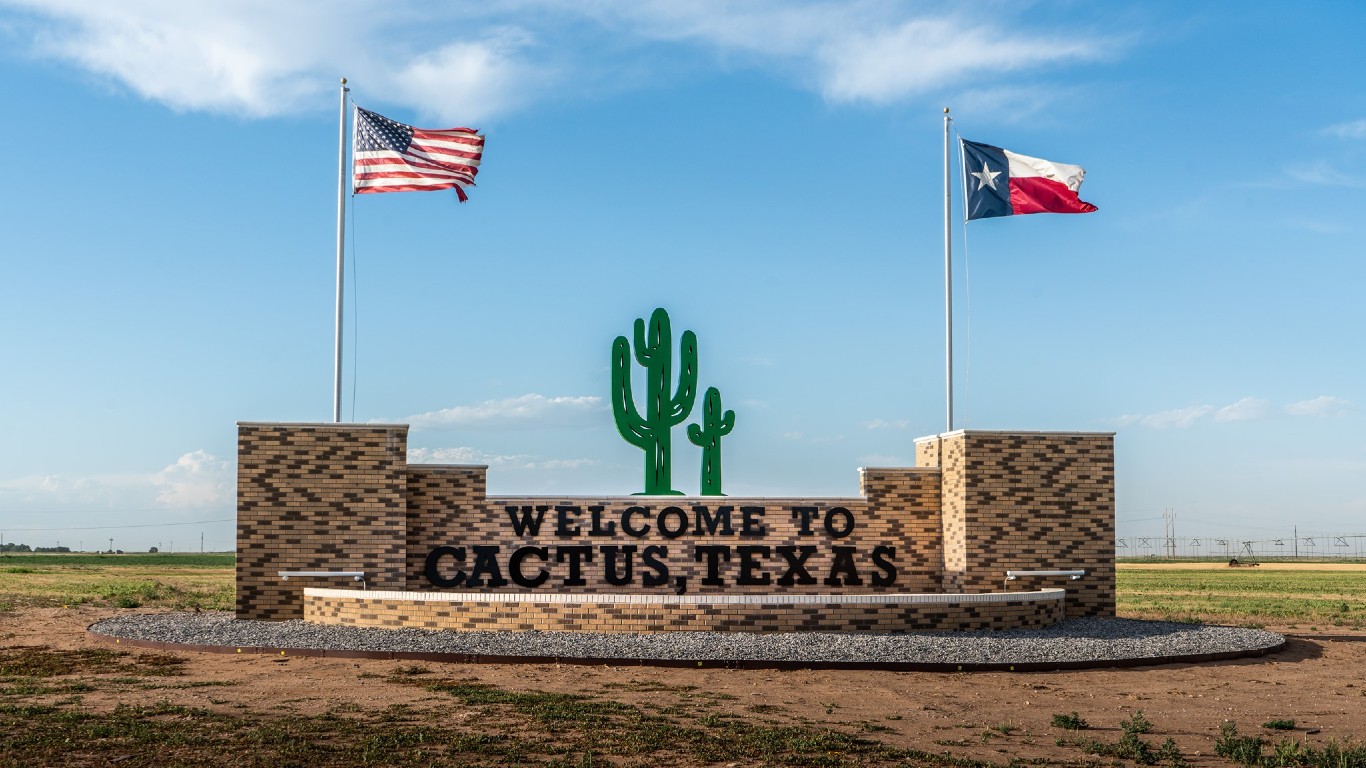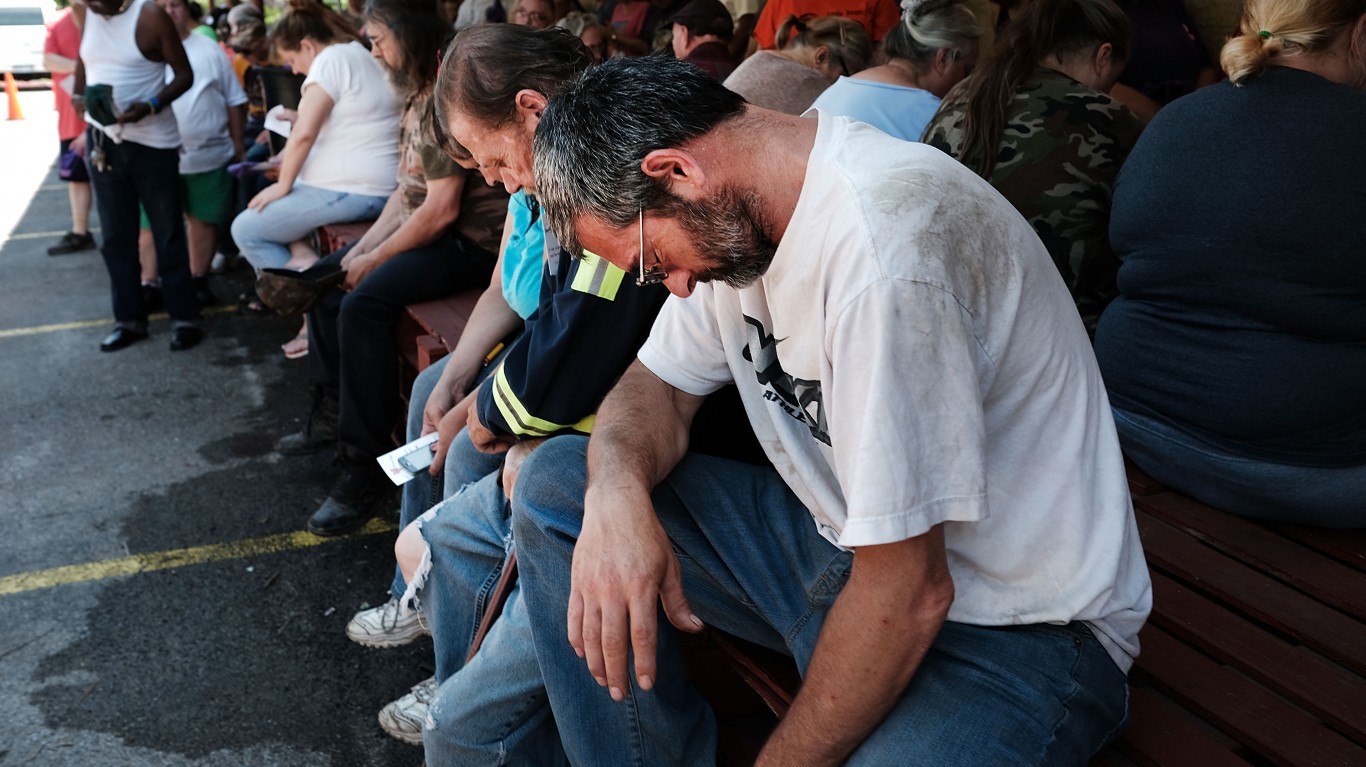
Using education data from the U.S. Census Bureau, 24/7 Wall St. identified the least educated town in the United States. For our purposes, towns are defined as any place covered by the census within the 50 states and the District of Columbia with a population between 1,000 and 25,000.
According to the Bureau of Labor Statistics, the unemployment rate among adults with a four-year college education was 5.5% in 2020. Meanwhile, the jobless rate among those with no more than a high school diploma was 9.0%. In the least educated town, the five-year average overall unemployment rate among 25- to 64-year-olds is higher than the comparable national rate of 4.4%.
In addition to being better protected from unemployment, Americans with a bachelor’s degree also tend to have higher salaries. The average weekly wage for a college-educated worker in the United States is about 67% higher than it is for those with no more than a high school diploma. In places with lower than average educational attainment, incomes also tend to be lower than average. In all but one town on this list, the typical household earns less in a year than the national median household income of $62,843.
To determine America’s least educated town, 24/7 Wall St. reviewed five-year estimates of the percentage of adults 25 years and over with at least a bachelor’s degree in U.S. towns from the Census Bureau’s 2019 American Community Survey (ACS).
We used census “place” geographies, a category that includes 29,573 incorporated legal entities and census-designated statistical entities. We only considered the 29,320 places that had boundaries that fell within one of the 50 states or the District of Columbia. We defined towns based on population thresholds (having at least 1,000 people and less than 25,000 people) and 13,332 of the places fell within these thresholds.
Towns were then excluded if bachelor’s degree or higher attainment rates were not available in the 2019 ACS, if the town’s 25 and older population was less than 1,000, or if the sampling error associated with a town’s data was deemed too high.
The sampling error was defined as too high if the coefficient of variation (a statistical assessment of how reliable an estimate is) for a town’s bachelor’s or higher attainment rate was above 15% and greater than two standard deviations above the mean coefficient of variation for all towns’ bachelor’s or higher attainment rate. We similarly excluded towns that had a sampling error too high for their 25 and over population estimates, using the same definition.
The remaining 10,738 places were ranked based on the share of adults 25 years and over with at least a bachelor’s degree. To break ties, we used the percentage of adults 25 and over who have completed at least high school or its equivalent.
Additional information on the share of adults 25 years and over who have completed at least high school or its equivalent, median household income, unemployment rates for the 16 and older population in the civilian labor force and population figures are also five-year estimates from the 2019 ACS.
The least educated town in America is Cactus, Texas. Here are the details:
- Adults with at least a bachelor’s degree: 0.0% reported
- Adults with at least a high school diploma or equivalent: 27.3% (lowest)
- Median household income: $40,417 (tied for 2,011th lowest)
- Estimated unemployment rate 2015-2019: 0.5% (tied for 10,502nd highest)
- Population: 3,245
Click here to see all of America’s least-educated towns.
Get Ready To Retire (Sponsored)
Start by taking a quick retirement quiz from SmartAsset that will match you with up to 3 financial advisors that serve your area and beyond in 5 minutes, or less.
Each advisor has been vetted by SmartAsset and is held to a fiduciary standard to act in your best interests.
Here’s how it works:
1. Answer SmartAsset advisor match quiz
2. Review your pre-screened matches at your leisure. Check out the advisors’ profiles.
3. Speak with advisors at no cost to you. Have an introductory call on the phone or introduction in person and choose whom to work with in the future
Thank you for reading! Have some feedback for us?
Contact the 24/7 Wall St. editorial team.




